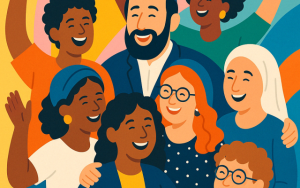
 by Rabbi Eric Leiderman, a Chicago-based educator and community builder. He is a dedicated advocate for vibrant, inclusive Jewish life, working to inspire the next generation through education, activism, and leadership. Rabbi Leiderman serves as Secretary for MERCAZ USA and is a candidate on the MERCAZ USA slate for the World Zionist Congress election.
by Rabbi Eric Leiderman, a Chicago-based educator and community builder. He is a dedicated advocate for vibrant, inclusive Jewish life, working to inspire the next generation through education, activism, and leadership. Rabbi Leiderman serves as Secretary for MERCAZ USA and is a candidate on the MERCAZ USA slate for the World Zionist Congress election.
In the days and weeks following the October 7 Hamas massacre, something rare stirred across the Jewish world: unity. We wept as one. We posted in solidarity. We donated. We prayed. We showed up. For a moment — brief, beautiful, and raw — we remembered what it meant to be am echad, one people.
But the unity didn’t last.
It didn’t even last long enough to get through shloshim. By November, old fault lines re-emerged with a vengeance. Arguments over Zionism, over who counts as a Jew, over which lives are mournable and which aren’t, over the right protest sign or the wrong tweet—all returned with sharper edges, amplified by fear and a fractured digital ecosystem. And within the Jewish world itself, the disunity cut deepest of all.
We need to talk about it — not only to diagnose what went wrong, but to understand what it means for Jewish peoplehood and our collective future.
From Collective Trauma to Individual Tribes
October 7 should have been a turning point: the largest massacre of Jews since the Holocaust, carried out with gleeful sadism, while livestreamed to the world. Jews of every denomination and disposition felt the rupture. Israeli families were broken. Diaspora Jews were shaken. And then, in an almost surreal inversion, the victims were blamed.
In response, many Jews instinctively huddled together. Reform, Orthodox, secular, progressive, traditional, Mizrahi, Ashkenazi, American, French, Israeli — we gathered in vigils, stood side-by-side in rallies, exchanged broken messages across oceans: Are you okay? Are we okay?
But as the initial wave of grief receded, something else surfaced. Instead of drawing closer, we began to retreat into our ideological corners. We started policing one another’s language and loyalty. One group accused another of being too silent. Another accused the first of being too loud. Some demanded unequivocal support for Israel. Others issued cautious “both sides” statements that felt morally hollow and disconnected from the horror. Rabbis were condemned for what they did say—or what they didn’t. Synagogues lost members. Students were disowned by their rabbis. TikTok Torah replaced nuanced conversation. The air grew thick with suspicion and scorn.
And then came the World Zionist Congress elections.
Sinat Chinam in a Google Form
Every five years, Jews around the world vote in the World Zionist Congress elections — a rare and powerful opportunity for real democratic representation of Diaspora Jewry. It should be a time of vision and values, a chance to shape Jewish life globally. But this year, it has become a microcosm of the very divisions that are tearing us apart.
Instead of unity around shared goals — supporting Israel’s democratic institutions, funding Jewish education, preserving the Jewish people — we have seen slates launch attack ads. Distorted claims. Inflamed rhetoric. Even accusations of cheating and voter manipulation.
All while Israeli hostages remain underground in Gaza.
It felt grotesque. But it wasn’t new.
In the Talmud, the rabbis ask why the Second Temple was destroyed. Was it because of idol worship or immorality? No, they answer. It was sinat chinam—baseless hatred among Jews. The inability to tolerate difference. The refusal to see one another as part of the same covenantal people.
It’s easy to relegate that phrase to ancient times. Harder to admit how familiar it feels in 2025.
We Are a People Who Count
We are now in the period of Sefirat HaOmer — a sacred season of counting. We count each day from Passover to Shavuot, from redemption to revelation. And we remember the deaths of Rabbi Akiva’s students during this same season, a national tragedy attributed not to plague or war, but to a failure to respect one another.
This year, we are counting other things, too.
We are counting the days the hostages have been held—over 550.
We are counting the names of those murdered on October 7.
We are counting attacks on Jews around the world.
We are counting how many people are still paying attention.
And now, we must count ourselves.
Because what is at stake is not just memory — it is agency. It is how we, as Jews, show up for one another and for the future of the Jewish people.
A Moment of Reckoning — and Opportunity
This election is not just about symbolism. The World Zionist Congress directs billions (with a “B”) of dollars. It sets global Jewish priorities that impact everything from Israel education and summer camps to synagogue programming, humanitarian aid, and religious life in Israel and around the world.
More votes have already been cast in this year’s WZC election than in recent memory. That surge reflects something powerful: a hunger to be heard. Jews across the United States are paying attention. They are showing up. But this moment is not finished—it is just beginning.
Voting in the WZC elections is not only our right as American Jews — it is our responsibility. If we do not show up, we forfeit our voice. When we abstain, we let others decide what the Jewish future should look like without us.
If you believe in a vision of Judaism that embraces pluralism, democracy, Torah, and love of Israel — then your vote matters. If you believe in a Jewish people that still believes in peoplehood, even in our differences — then your vote matters. If you believe we can be better than the forces tearing us apart—then your vote matters.
We must strive for representation that reflects the full spectrum of the American Jewish community — its values, its vitality, its moral clarity, and its compassionate complexity. We have the chance, right now, to help the World Zionist Congress live up to its potential: not just as an institution, but a parliament of the Jewish people.
So vote. Not out of fear, but out of hope. Not to deepen the divides, but to bridge them. Not just to be counted — but to count for something.
Because if we can’t count on each other — what’s left?
—
Shameless Plug:
If any part of this piece resonated with you — if you believe in an Israel that values Jewish pluralism, democracy, and a future where every Jew has a seat at the table — I’m running on Slate #17: MERCAZ USA in the World Zionist Congress election.
Please vote for me. Your vote is your voice in shaping the Jewish future.